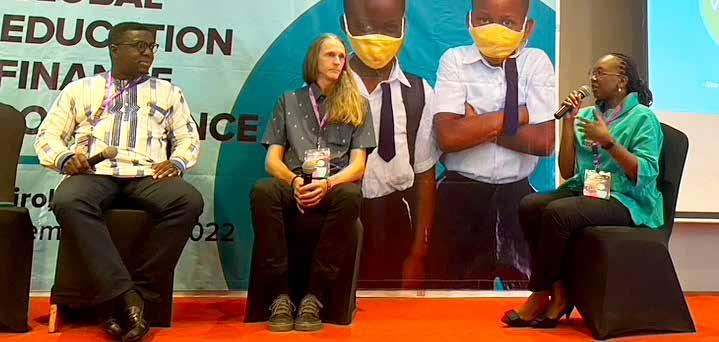
3 minute read
DAY 1
Session Agenda
⊲ The EduFinance Market Opportunity
⊲ Sharing Personal Experience: Education Lending & Why Education Matters
⊲ Designing Loan Products that Meet the Needs of Schools
⊲ Unlocking the Barriers to Effective School Lending
⊲ Growing a Profitable School Fee Loan Product
Session Highlights
Attendees received a pre-released copy of the latest State of the Affordable Non-State School Sector report, and learned what the research says about market demand for education financing, estimated at US$36 billion. This includes the need to add 56 million additional seats for children in affordable non-state schools through 2025 to keep up with demand trends.
During the panel on sharing experiences in education lending –
⊲ Kamram Azim of Taleem Finance Pakistan noted that ‘passion and resilience is a must’ for any institution working in EduFinance. He also framed the mission in the context of the pandemic, stating the “vaccine” we are working on is education that will save future generations.
⊲ Bunmi Lawson of EdFin Microfinance Bank Nigeria outlined the ways the bank addressed the many challenges brought on by COVID-19, and emphasized the opportunity to consider the full value chain for education lending – schools, parents and other education service providers.
⊲ Sandeep Wirkhare of Indian School Finance Company reflected on the opportunities in technology to advance education lending, from lowering operating costs, reducing approval time for education loans, and automating underwriting, to providing digital school fee collection platforms to partner schools.
⊲ Roberto Gimenéz of Fundacion Paraguaya pointed to the way the pandemic showed the many needs existing within the education sector, from infrastructure and working capital, to investments in technology and developing trust between schools and financial institutions. He emphasized that portfolio quality is ultimately driven by good training of staff offering the financing, appropriate product design adapted to demand, and good credit analysis including factors such as student enrolment and school reputation in the community.
The discussion took a more personal tone when a new panel was asked to share why education matters.
⊲ Simón Ziba of Vision Fund Zambia reminded everyone that education is not a given for many children, and yet education lets us break poverty patterns and is the best equalizer in a society.
⊲ Atul Tandon of Opportunity International shared his personal educational journey that started in India and the opportunities that led him to college. He posed the question of how we create systemic solutions to structural problems that limit access to quality education for all, and challenged philanthropic capital to invest in opportunities that further mobilize private capital investment in affordable education.
⊲ Emilio García of Coopsama Guatemala explained that thanks to the effort made by his dad he was able to attend school and educate himself. Without this opportunity he would not be the CEO of the cooperative where he has worked his way up for the past 30 years.
Additional sessions focused on the opportunities of education lending when looking at the full education ecosystem, anchored by the local school at the center. The ‘ecosystem’ approach unlocks synergies between the financial institution and school owners, parents, teachers, and school suppliers that can benefit and meet the needs of all stakeholders.
Day 2
Session Agenda
⊲ Growing your Education Finance portfolio
⊲ Increasing the Profitability of your Education Finance Portfolio
⊲ Innovative Education Finance Products
⊲ Financing Schools Beyond Collateral: A Digital Solution
⊲ Limiting Arrears of my Education Finance Portfolio
⊲ Funding my Education Finance Portfolio
⊲ The Financial, Marketing & Social Benefits of Improving School Quality for Lenders
Session Highlights
One of the ways EduFinance supports financial institutions to grow Education Finance portfolios is through the ‘School Leadership Academy.’ These workshops aim to increase lending to unbanked schools by bringing together school owners and financial institutions. Financial institutions that have participated in School Leadership Academy workshops to date shared their experiences.
A role play set in a local branch office where an unbanked school owner sought information from a very unhelpful loan officers provoked laughter from the audience, while also resonating with attendees that further shared their takeaways:

⊲ Loan officers need to be trained, not only on the ‘script’ but also how to handle people. If you don’t build this capacity within your staff, you will lose clients.
⊲ The biggest challenge is the [staff] mindset. There needs to be a value besides the loan, like mentorship, training, etc.
⊲ It is very important to work on a communication matrix to put expectations in place… there is reputational risk when potential clients are poorly served.
⊲ Service attitude is everything. You have to be consistent.
⊲ The business is not financial; it is a service…as leaders you can have the vision, but you have to align with the rest of the work team.
Attendees also reflected on a range of innovative Education Finance products, including gender centric products offered by Kashf in Pakistan to school payment platforms such as SchoolPay enabling cash-flow based lending approaches.
Oiko Credit and Blue Orchard then shared ways financial institutions could apply for capital to fund new and growing Education Finance portfolios.





